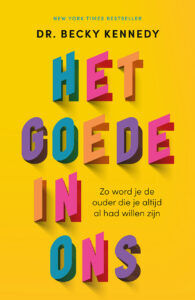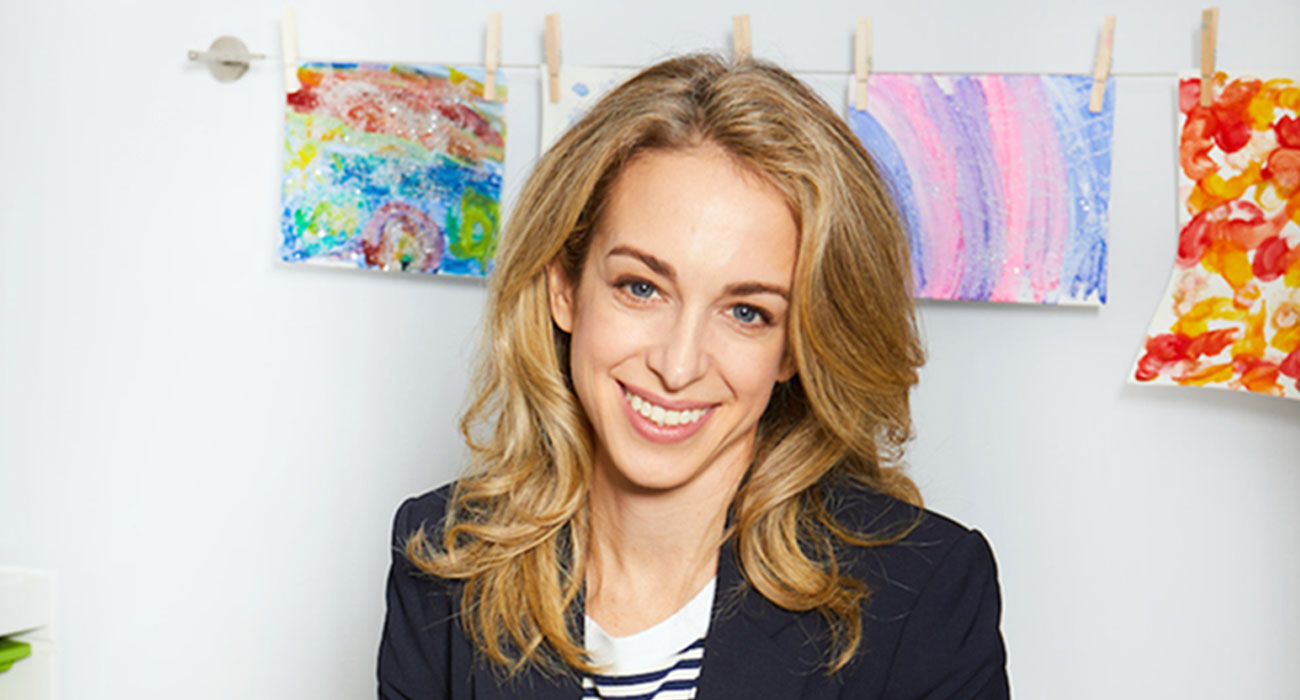“I’m not afraid that we will raise children to princes and princesses with my method”
Nothing time-out and naughty chairs; if it’s up to the American psychologist Becky Kennedy we stop punishing and show understanding for our children, she advocates in her bestseller The good in us.
When clinical psychologist Becky Kennedy became a mother (she now has three children), she quickly discovered that she hated punishment. And so she developed her own parenting method that she believes brings out the best in you.
“Whether this would finally be good parenting advice? Connecting to your child instead of punishing is rather a new approach,” says Becky Kennedy – or Dóctor Becky Kennedy as the Americans call her – from her New York office.
Contents
Parenting method
“My view that your child’s behavior and his identity are two different things is an eye-opener for many parents. But the idea behind it is simple: behavior only shows what your child needs and that realization gives you the chance to discover what he really is. The good news: you can start with yourself to understand that.
Suppose you didn’t get around to sending that one email this morning. Or to exercise when you intended to. Does that say anything about who you essentially are? That you are not empathetic or loving? Oh no? If you see through that, you can also apply it to your child.
Many parenting styles, especially from the generations before us, are about shaping behavior. If you do this you get a reward, if you do that you get a punishment. But you are not raising a human being with complex emotional needs. It’s just conditioning.
Trust bond
Of course you can’t expect your child to immediately jump into line with this insight. To get through to your child and make real contact with him, you first have to build up ‘connection capital’. It is important that you build a relationship of trust with your child in which you really have an eye for him.
“It is important that you build a relationship of trust with your child in which you really have an eye for him.”
This can be done with the help of a few fairly simple basic strategies, of which I think ‘Play Without Phone’ time – SZT time – is the most important. I came up with that rule when I realized how distracted I was with my phone nearby and not giving my kids my full attention. During SST time, you’re supposed to be completely focused on your child’s world, and go along with his play and ideas – no matter how uncomfortable that may feel at first.
Refueling game
Another effective strategy: the Refueling Game. When my eldest child found it difficult to reconcile with the birth of my youngest and became stubborn, cheeky and angry, I said: ‘I don’t think you have enough mama in you, I think I’m only ankle-deep!’ Then we had to refuel. Cuddling until we dropped, until he said, “Yes, now you’re up to here,” and pointed to his heart.
Another strategy: the Emotional Vaccination. This prepares your child for future ‘misery’, such as handing in the iPad. If you say in advance, “Before you get the iPad, let’s think about how it feels when you have to return it,” you will save yourself and your child a lot of hassle in the long run. Say, “It’s hard to stop doing what you love, isn’t it? I agree.’
Not a holy grail, but this way you teach your child step by step skills to deal with difficult emotions and to become resilient.
Also read – ‘I sometimes ask my children how I can be a better mom for them’ >
Playful approach
Approach it playfully, let your child know how similar situations feel or felt to you when you were young with the comment: did I ever tell you that…? Sit next to him to empathize with his feeling and approach it on his level.
Oh, and above all, don’t forget to take care of yourself. To connect with your child, you first have to have the energy yourself, so give yourself that warm bath and let what you feel sink in. Do you want your child to say about you later, “My mother never took care of herself because she was too busy taking care of us?” Not me.
I hope my children will say later, ‘My mother showed me that parenting does not mean losing yourself. Raising means helping your child to develop and grow, while also developing and growing yourself.’
Self confidence
In my practice I see many people who know what kind of parent they want to be, but don’t know how to become it or if they are even capable of it. Who run into problems with their child such as tantrums, hitting, brutality, not wanting to listen, insecurity, fear of abandonment, lying, rivalry between their children and so on.
“Many people know what age they want to be, but not how to become it”
Many parents have lost confidence in themselves and think they are not up to parenting. But they are, and it starts with themselves. I try to give them that confidence back and let them see that almost everyone naturally has the qualities to raise their children well, and to make that connection.
I’m not afraid that we will raise them to princes and princesses with my method. Or discussing too much with our children. It was not. Of course it is important that they listen and follow the rules, but it is also important that they later become free spirits, rather than blindly following what others dictate. That only works if they feel the space and safety to develop into who they are. If you stimulate this from a loving connection, you also prevent them from becoming rigid adults who cannot cooperate or cooperate.
Define borders
My method is none one size fits allEvery child and every parent is different. But if you assume that your child is basically a compassionate, loving and generous person like you, you teach your child that he is good just the way he is. Then he grows up confident and trusts what he feels, because what he feels is allowed to be there. This also helps him to set boundaries later on.
No, not that I’m the perfect mom. I can still use my own book very well. My husband sometimes shouts when I get out of my head: “Hey, read on page X or in that chapter.” Because at home I’m not Dr. Becky, but also just mom.”
Read more? The good in us, € 24.99, Bruna Publishers. Also check out goodinside.com

Read the best stories, most recognizable columns and the best tips for you and your kids every month. Subscribe to Kek Mama now and get up to 45% off.



